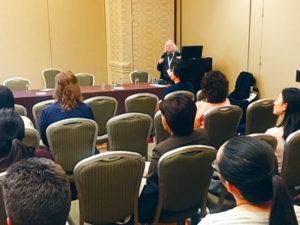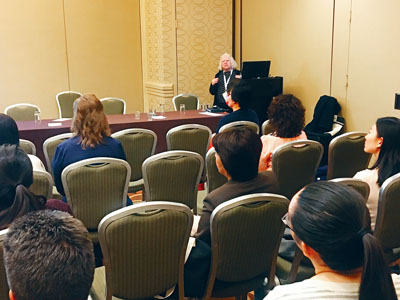By April Xu. This article originally appeared in the Sing Tao Daily.

Cathy Berkman, associate professor at the Graduate School of Social Services at Fordham University said language mattered for some differences in Chinese seniors’ perspectives on advance directives and end-of-life preferences.
Scholars at Fordham University in New York presented their recent research on Chinese seniors’ perspectives about advance directives and end-of-life (EOL) preferences at the Gerontological Society of America (GSA) 2018 Annual Scientific Meeting, held in Boston in November. Because most studies on this subject “treat Asians as one group,” the researchers differentiated Mandarin and Cantonese speakers to discern any differences in their knowledge, attitudes, and behaviors toward end-of-life care.
The researchers said their preliminary findings show that the 150 Chinese elders who spoke Mandarin have somewhat higher knowledge about and more positive attitudes towards having a health care proxy to make decisions for them, should they become incapacitated, than the 112 Cantonese speakers in the study. The Mandarin speakers were moderately more apt to appoint a health care proxy, and they were generally more positive when asked about choosing palliative care, if they were diagnosed with a life-threatening illness.
The study showed, though, “Mandarin speakers were more likely to want life-sustaining treatment at the EOL, including if in a permanent coma. Cantonese speakers were more likely to want pain medication, even if it shortened their life.”
The researchers found no differences between the two groups in their preferences for communication with family or physician about diagnosis, prognosis, and EOL treatment. However, Mandarin speakers said they were more inclined to want to discuss EOL treatment preferences with family.
NYC Chinese Population Growing
Presenting the analysis was Cathy Berkman, associate professor at Fordham University’s Graduate School of Social Services, and doctoral student Xiaofang Liu.
According to Berkman, who also directs Fordham’s Palliative Care Fellowship program,
Chinese residents in New York City constitute the largest ethnic Chinese population outside of Asia. The number of Chinese seniors in New York was 81,240 in 2015, and there are at least nine Chinatowns in New York City. From 2000 to 2010, the Chinese population in New York City increased by 47 percent, and the Chinese population in New York State is the fastest growing nationally.
In both the Mandarin and Cantonese groups of Chinese seniors, one-fourth or less knew of the health care proxies and advance care planning directives, and completion of these documents was low in each language group for either a living will or health-care-proxy document.
At present, elderly Chinese immigrants in America have very limited understanding of their options, according to the study. Previously, few studies on this issue have included adequate samples of older Asians in the United States.
The researchers’ earlier analysis of their study data also revealed that “misconceptions and negative attitudes about advance directives were prevalent” in both groups. For instance, few could correctly define either living wills or health care proxies. And more than four in 10 erroneously believed that “once end-of-life preferences are documented, they cannot be changed.”
Berkman and Liu conducted 30-45-minute personal interviews with a cross section of 262 Chinese seniors in Mandarin and Cantonese at six senior centers in the Chinatown and Flushing, N.Y. areas. More than half (57 percent) of the interviewees are Mandarin speakers, and 43 percent speak Cantonese as their first language.
The results show that compared to Cantonese-speaking elders, Mandarin speakers have somewhat higher knowledge of advance directives and end-of-life preferences, as well as having more positive attitudes toward choosing a health care proxy and writing a living will. In addition, they are more apt to speak with a family about advance directives and end-of-life preferences than their Cantonese counterparts.
Compared to Mandarin speakers, though, Cantonese speakers are more likely to appoint a health care proxy and to choose a palliative-care approach. Berkman also pointed out that language mattered for some outcomes, but not consistently, and it is not clear why language mattered.
Community Education a Key Step
Liu emphasized that education is a key step for health care professionals in improving Chinese seniors’ understanding of advance directives and end-of-life preferences.
Chinese seniors need to be more aware of treatment choices at the end-of-life stage and learn to how to have the conversation with family and health care providers. To achieve this goal effectively, the education must be done in a culturally appropriate way with understanding of barriers to talking about death and dying.
Liu said the barriers to better EOL care are related to Chinese culture. For example, discussing serious illness and death is a taboo in Asian community and filial piety, reverence for family elders, tends to obligate adult children to prefer extending their parents’ lives at all costs.
In addition, the Chinese preference for collective decision-making and health care providers may share the same views. Liu said only by increasing people’s knowledge about advance directives can change people’s attitude towards advance directives, and can finally lead to higher completion of advance directive.
This article is translated and adapted from April Xu’s original article for the Chinese-language newspaper, Sing Tao Daily New York edition. She wrote it with the support of a journalism fellowship from the Gerontological Society of America, Journalists Network on Generations and the Silver Century Foundation.
The opinions expressed in this article are those of the author and do not necessarily reflect those of the Diverse Elders Coalition.

